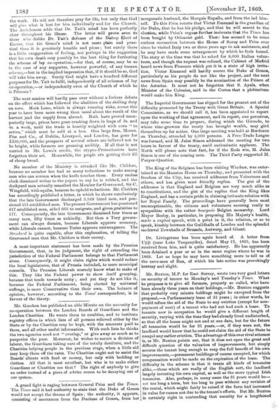The other document is a letter written at Dr. Tait's
request since his seizure by the Archdeacon of Canterbury to the Vicar of Margate, in which the Archdeacon says that Dr. Tait had felt great anxiety before his illness, and has continued to feel it daring his illness, on the subject of organizing a more efficient system of lay-help for the Church. He entreats the Vicar to call the intended ruridiaconal conference, "not now for discussion, but for prayer." "Prayer," the Archbishop wished him to insist, "is better than discussion," and though he had wished to live specially to organize a better system of lay-help for the Church, it is very possible, he says, that his life might prove less an assistance than a hindrance to the work. He will not therefore pray for life, but only that God will give what is best for him individually and for the Church. The Archdeacon adds that Dr. Tait's mind has been perfectly clear throughout his illness. The letter will prove even to those who dislike Dr. Tait's defence of the Bishop Elect of Exeter, that his Grace's mind is not more plain and praa- tical than it is genuinely humble and pious ; but surely there is a little exaggeration of feeling, not perhaps in the suggestion that his own death may possibly be the best thing for furthering the scheme of lay co-operation,--for that, of course, may be so in the case of any supporter, however powerful, of any human scheme,—but in the implied impression that, if it should be so, God will take him away. Surely God might have a hundred different purposes for Dr. Tait to fulfil, independently of all schemes of lay co-operation,—or independently even of the Church of which he is Primate?



































